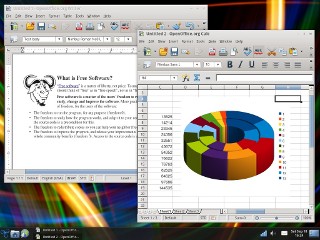Richard Stallman announced in September 1983 the plan to develop a free software Unix-like operating system called GNU. GNU is the only operating system developed specifically for the sake of users' freedom.
What is GNU?
The GNU Project was launched in 1984 to
develop a complete Unix-like operating system which is free software—software which
respects your freedom.

Unix-like operating systems are built from a collection of applications, libraries, and
developer tools—plus a program to allocate resources and talk to
the hardware, known as a kernel.
The Hurd, GNU's kernel, is actively
developed, but is still some way from being ready for daily use, so GNU
is often used with a kernel called
Linux.
Download GNU
now
GNUs Flashes
Interested in free video formats? We need your help! The FSF is looking for a few volunteers willing to commit an average of a few hours per week as reliable technical consultants helping people transcode their videos to free formats like WebM and Ogg Theora.
The June issue of the Free Software Supporter is out -- you can read it and subscribe to receive future monthly issues by e-mail.
GNU urges people working on free software to follow standards and guidelines for universal accessibility on GNU/Linux and other free operating systems with the release of the GNU Accessibility Statement.
For other news, as well as for items that used to be in this GNUs
Flashes section, see What's New in
and about the GNU Project.
GNUstep
GNUstep is a fully-functional
object-oriented development environment. We need developers to write and
port applications to GNUstep so that we can make it a great experience
for users.
The combination of GNU and
Linux is the GNU/Linux operating system, now used
by millions and sometimes incorrectly called simply
“Linux”.
The name “GNU” is a recursive acronym for “GNU's
Not Unix!”; — it is pronounced g-noo, as one
syllable with no vowel sound between the g and the
n.
What is Free Software?
“Free software”
is a matter of liberty, not price. To understand the concept, you
should think of “free” as in “free speech”,
not as in “free beer”.
Free software is a matter of the users' freedom to run,
copy, distribute, study, change and improve the software. More
precisely, it refers to four kinds of freedom, for the users of the
software:
- The freedom to run the program, for any purpose (freedom 0).
- The freedom to study how the program works, and adapt it to your needs
(freedom 1). Access to the source code is a precondition for this.
- The freedom to redistribute copies so you can help your neighbor
(freedom 2).
- The freedom to improve the program, and release your improvements
to the public, so that the whole community benefits
(freedom 3). Access to the source code is a precondition for this.
Can you contribute to any of these High Priority
Projects? GNU PDF, Gnash, coreboot, free distributions of
GNU/Linux, GNU Octave, drivers for network routers, and reversibble
debugging in GDB, and also free software replacements for Skype, OpenDWG
libraries, RARv3 and Oracle Forms.
Can you help take over an unmaintained GNU
package?
alive,
dr-geo,
fontutils,
gift,
gleem,
goldwater,
halifax,
pgccfd,
polyxmass,
quickthreads,
sather, and
snakecharmer
are all looking for maintainers. More information.
